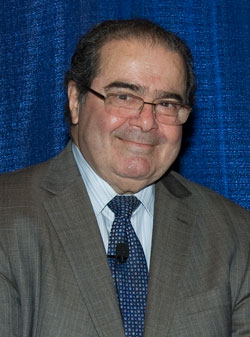Is torture unconstitutional? Scalia returns to the subject

File photo of U.S. Supreme Court Justice Antonin Scalia courtesy of ABA Media Services.
Torture isn’t necessarily unconstitutional, Justice Antonin Scalia claimed in a radio interview last week.
Scalia said the U.S. Constitution says nothing about torture, though it does bar cruel and unusual punishment. Swiss National Radio provided the MaddowBlog with a transcript of his remarks.
Torture is forbidden “if it’s imposed as a punishment,” Scalia said. “If you condemn someone who has committed a crime to be tortured, that would be unconstitutional.”
When the interviewer began to ask about torture in interrogations, Scalia had this to say:
“We have never held that that’s contrary to the Constitution. And I don’t know what provision of the Constitution that would, that would contravene.
“Listen, I think it is very facile for people to say, ‘Oh, torture is terrible.’ You posit the situation where a person that you know for sure knows the location of a nuclear bomb that has been planted in Los Angeles and will kill millions of people. You think it’s an easy question? You think it’s clear that you cannot use extreme measures to get that information out of that person? I don’t think that’s so clear at all.”
It’s not the first time Scalia discussed torture with a Los Angeles bomb hypothetical. He discussed the bomb scenario in a 2008 interview with BBC Radio, and said there is no express constitutional ban on torture in a 2008 speech to Missouri college students. Torture is “a bad thing to do. But not everything that is bad is unconstitutional,” he said in the college speech.



